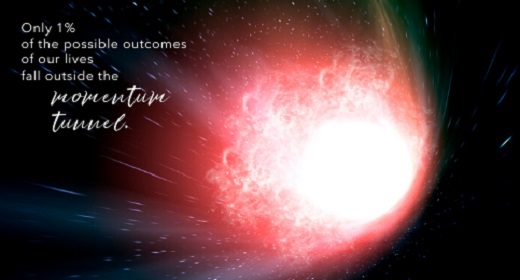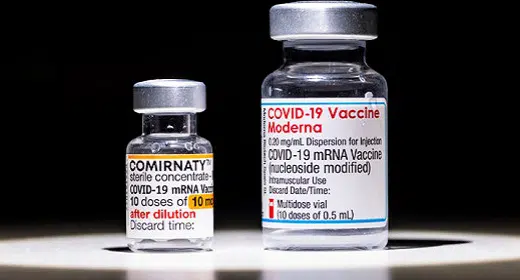by Beth Mole: The findings add further weight to the idea of mix-and-match boosting…
The mRNA-based COVID-19 vaccines made by Pfizer/BioNTech and Moderna have proven highly effective at priming our immune systems to fight the pandemic coronavirus—preventing substantial amounts of infection, severe disease, and death throughout several waves of variants. But despite their similar design and efficacy, the two vaccines are not exactly the same—and our immune systems don’t respond to them in the same way.
An early hint of this came from some real-world data that found startling differences in the effectiveness of the two vaccines, despite both shots performing nearly identically in Phase III clinical trials, with efficacies of 95 percent and 94 percent. Amid last year’s delta wave, a Mayo Clinic study found that Pfizer’s effectiveness against infection dipped to 42 percent while Moderna’s fell to 76 percent.
According to a new study in Science Translational Medicine, such differences might be explained by evidence that the two vaccines spur the immune system to produce slightly different antibodies against SARS-CoV-2.
Both vaccines generate strong levels of neutralizing antibodies, which can bind to the virus and prevent it from infecting cells. But according to the study, the vaccines generated different antibody profiles overall. Specifically, the antibody response to the Pfizer/BioNTech vaccine skewed to a class of antibodies called IgG and IgM, which are often found in the blood. The Moderna vaccine, meanwhile, generated relatively elevated levels of IgA antibodies, a class of antibodies generally found on mucosal surfaces, such as the respiratory tract—where SARS-CoV-2 infections begin. Additionally, the Moderna vaccine spurred relatively higher levels of antibodies that activate immune cells called natural killer cells. It also generated higher levels of antibodies that activate immune cells called neutrophils to ingest and kill (phagocytize) invading germs.
Detailed differences
The study, led by Harvard immunologist and virologist Galit Alter, identified the differences by comparing the antibody profiles of 28 people vaccinated with the Moderna vaccine and 45 people vaccinated with the Pfizer/BioNTech vaccine. The numbers were small, and the participants were largely healthy young female medical workers, which is not representative of the overall population. The study also didn’t look at immune responses over time. Instead, the researchers looked at antibody profiles about a month after each participant received a second vaccine dose.
Still, “despite these limitations, these data provide evidence for potential nuanced differences in the quality of the humoral immune response induced by SARS-CoV-2 mRNA vaccines,” Alter and her colleagues wrote. Though both vaccines produce strong immune responses overall, these slight antibody variances “might provide insights into potential differences in protective immunity conferred by these vaccines,” they concluded.
Alter and her colleagues will have to do more research to determine if these differences are linked to varying levels of protection and vaccine effectiveness. And they’ll also need to do more research to understand what exactly is causing the differences. The Pfizer/BioNTech and Moderna vaccines are not only made with distinct formulations of components; they are also given at different doses and different time intervals between doses. Moderna’s vaccine is given as two 100 microgram doses four weeks apart, while the Pfizer/BioNTech vaccine is given as two 30 microgram doses three weeks apart.
Those factors could alter how the immune system responds to the vaccines. But digging into those distinctions could help researchers create “tunable” mRNA vaccines that generate specific antibody responses to provide the strongest protection. In the meantime, the findings make a case for people to mix and match mRNA vaccine boosters, particularly if they’ve started with doses of the Pfizer/BioNTech vaccine. Switching to another vaccine for a future booster could diversify antibody responses, providing broader protection.










































